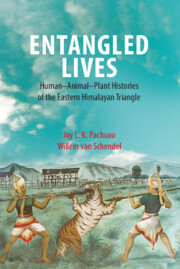8 - Cultural Geographies
Published online by Cambridge University Press: 15 June 2022
Summary
In Part II of this book (‘Cosmologies’ – Chapters 5–7), we looked at more-than-human histories as expressed and experienced by Triangle people themselves. The chapters provided a bird’s-eye view of how they narrated the origins of the universe and human societies, how they understood the passing of time and how they imagined relationships between humans, animals, plants and the spirit world. There was considerable variation in these accounts but also what we have called ‘cosmological commonalities’ (Chapter 5).
We now turn our attention to how these ideas interacted with numerous new ways of thinking that affected the Triangle during the past century and a half. We begin Part III with a chapter on cultural geographies, the spatial dimensions of more-than-human histories. The chapters that follow (Chapters 9–11) are concerned with quite rapid change over the past several generations, as humans intensified their exploitation of the Triangle's natural resources. We will trace how this led to ecological devastation, attempts at conservation and new forms of human–non-human conflict.
In this first chapter of Part III we are concerned with how the Triangle can be understood as a number of alternate spaces, each based on human–non-human interactions. We explore how the interplay of microorganisms, animals and plants created spatial patterns that changed over time with human and non-human mobilities. Some of these cultural geographies are rooted in Triangle ideas and traditions, and others in the imagination of outsiders. The ways in which these cultural geographies changed are often related to struggles between proponents of these different perspectives.
‘Civilisation’
The idea of the Triangle as the antithesis of something else is deeply rooted. Students of the earliest surviving South Asian writings have remarked upon a distinction in those writings that is still part of everyday thinking. This is ‘the opposition between the settled agricultural community (grāma) and the alien outside sphere of the jungle (araṇya)’. The two domains were seen as interdependent and complementary. They exchanged products and services but were culturally distinct. These writings in Sanskrit (an Indo-European language) elevated the settled life of agriculturists and their rulers over that of inhabitants of the jungle.
- Type
- Chapter
- Information
- Entangled LivesHuman-Animal-Plant Histories of the Eastern Himalayan Triangle, pp. 153 - 187Publisher: Cambridge University PressPrint publication year: 2022



